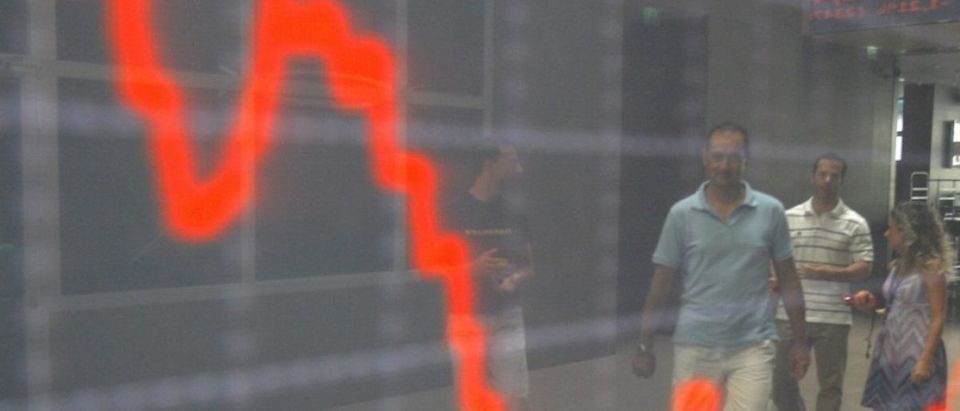The August rollercoaster in the stock market have Democrats predicting a recession that will begin just in time for the 2020 presidential elections. But a closer study of the American economy shows a recession is not necessarily on the horizon.
Wall Street panicked this month due to an “inversion” of Treasury bond interest rates. The inversion occurred when the rate for a two-year note was higher than the rate for a 10-year note. Inversions have happened before, usually about 18 months before a recession. What economic forecasters largely failed to mention is that while an inversion may be a leading indicator of a recession, it’s not a guarantee. Inversions do not, by themselves, cause a recession.
There are solid reasons why the American economy is not poised for a recession this year or next. (RELATED: Stephen Moore: The Only Reason For Recession? The Prospect Of Trump Ever Leaving Office)
First, unemployment remains low. While inner-city unemployment is higher and is a serious issue, however. on a national average, more people are working than before. In the western suburbs of Philadelphia, “help wanted” signs are everywhere. Granted, these are entry-level jobs, but they spring from an increased demand for a product (such as lattes), which comes from people having larger disposable incomes (to spend on lattes). Further, an entry-level job opening can come from turnover: people leaving entry-level jobs for higher-paying ones.
Second, the United States economy is robust. Europe is in an economic slowdown with an uncertain future as United Kingdom Prime Minister Boris Johnson seems determined make Brexit a reality. Further, China has lost a significant amount of manufacturing jobs to other south Asian countries, notably, Vietnam. The protests in Hong Kong also contribute to investors’ concerns about doing business in the People’s Republic.
Internationally, U.S. Treasury bonds are viewed as the one safe haven for investors, and demand is high. Institutional investors such as banks need safe havens, in order to guarantee their capital foundation. For example, Eurobonds are too risky ass nobody knows what the Euro will be worth in a post-Brexit European Union.
Third, there are no discernible bubbles in the economy. The Great Recession of 2007-09 had its roots in subprime mortgages, whereby mortgage lenders loaned money to people who did not meet the usual income/asset qualifications for a loan and to real estate speculators. Overabundant access to mortgages pushed housing prices up. However, the income of people with mortgages remained flat. Speculators, and later, ordinary homeowners found themselves unable to repay the mortgages, with many simply walking away from their homes. Finally, some large investment banks deeply involved in the mortgage business collapsed; they went bankrupt, received federal funds, or were taken over by stronger banks.
A similar scenario resulted in the recession of 1990-91, which, in turn, contributed to Bill Clinton’s victory over George H.W. Bush in the 1992 presidential election. In the late 1980s to the early 1990s, ‘Savings and Loan’ financial institutions collapsed from overextending mortgage credit in the housing market.
In the late 1990s, Bill Clinton’s administration was rocked by the bust of the “dotcom” bubble, a result of intense speculation in internet-related stocks. Back then, it was possible for a firm to go rapidly from a cocktail-napkin idea to an initial public offering in the stock market without producing anything (including profits).
Are there bubbles today? Albeit the unlikely case there’s a massive financial bubble undetected by financial news reporters, it would seem America’s economy is stable and bubble-free.
What about those inversions in Treasury bond rates? The backstory is a flight to safety by institutional investors seeking a shorter-term instrument with which to park their capital.
The bottom line: although Democrats may wish for a recession to help defeat Trump, it’s not going to happen. Those who see movements in Treasury bond rates as recession predictors are ignoring the lack of speculative bubbles that have caused recessions since the late 1980s.
President Trump has a stronger America. It has more jobs than when he started and a solid economy. It’s not that Trump is lucky. It’s the result of his economic policies. If he wants to win in November 2020, he should maintain a steady economic course and not frighten investors (bombarded with recession predictions) with tweets and off-hand comments.
Joanne Butler was an international trade specialist at the Office of the U.S. Trade Representative and at the Foreign Agricultural Service at USDA in the George H.W. Bush administration. In the George W. Bush administration, she was a senior adviser and speechwriter at the Department of Labor.
The views and opinions expressed in this commentary are those of the author and do not reflect the official position of The Daily Caller.


